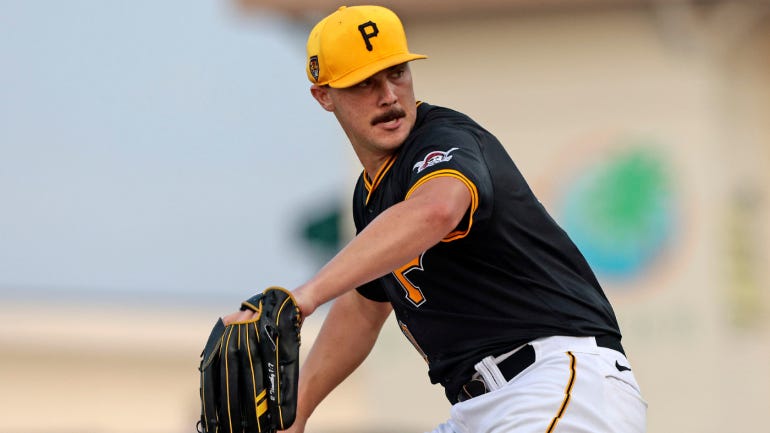Paul Skenes is Pursuing G(R)OAT Status - Greatest (Rookie) of All Time
Baseball's latest young phenom is living up to the hype and putting on a historic rookie campaign.
Every one of Paul Skenes’ ten career big-league starts have been appointment television across the sport. His outings captivate the attention of baseball fans near and far, and make headline news throughout the game. Frankly, the only disappointing part of his season thus far is that it didn’t start sooner, as the Pirates kept him in AAA until the second week of May. Earlier this season, following Skenes’ debut, I investigated how the careers of number-one overall draft picks have panned out while analyzing how much a player’s production in their rookie season foreshadows their career as a whole.1 Ultimately, I found a 0.853 correlation coefficient between career WAR/162 games and rookie season WAR/162 games for qualified #1-overall picks, which translates to rookie-year WAR/162 accounting for roughly 73% of the variation in career WAR/162. This is a fairly strong correlation in a highly variable sport like baseball. Should this hold true for Paul Skenes, we may want to prepare ourselves to witness an all-time great in the coming years. Already in his career, Skenes is tracking to become one of, if not THE, greatest rookie pitcher ever.
Already Among MLB’s Best
On Sunday, Skenes made history by becoming the first player to be named an MLB All-Star just one year after being selected first overall in the MLB Draft. As if that wasn’t impressive enough, many around the game are even campaigning for him to start the game for the National League, even though at only 10 starts and 59.1 innings pitched, he isn’t even qualified for the ERA title.2 These folks have a case, though. Putting aside the comparatively small sample size (he is just under 30 innings short of qualifying for the ERA title), his dominance is undeniable. The chart below plots ERA and strikeout rate (as K/9 - signifying strikeouts per 9 innings pitched) for pitchers who have thrown at least 50 innings this season. The horizontal line represents the MLB average ERA, and vertical line the MLB average K/9.
Even when dropping the minimum inning threshold to 50 innings, Skenes has had arguably the most dominant 2024 of any pitcher based on to these metrics.3
Historically Hot Start
Similarly to my recent defensive catcher rankings and greatest living ballplayer investigation, I found the geometric mean of rookie pitchers’ all-time rankings in key statistics through their first ten career starts. The geometric mean was used to limit the average of the rankings being skewed by an extremely high or low ranking relative to the others. This also helps neutralize the effect of correlated stats (i.e., total strikeouts are highly correlated with strikeout rate). The table below lists the pitchers with the best 10-start stretch to start their career in the live-ball era. The geometric mean, determining the pitcher’s overall score, is in the fourth column. You can scroll right on the table to see both each player’s all-time ranking in each stat, along with the actual stat that corresponds to it.
Skenes ranks behind only Masahiro Tanaka for the best through their first ten career starts. Tanaka’s rank may even come with a bit of an asterisk as well, as he played 7 seasons with the Tohoku Rakuten Golden Eagles of the Nippon Professional Baseball League in Japan prior to joining the Yankees in 2014. Skenes and Tanaka are head-and-shoulders above the rest, with the Gmean of third-place A.J. Griffin nearly 10-points behind Skenes.
Tracking Toward an All-Time Rookie Season
Should Paul Skenes continue at the same pace of production through the end of the season, he may wind up as the best rookie starter of all time. Based on his stats projected out to 20 starts (the FanGraphs projection for the total number of starts Skenes will make this season), he would tie Dwight Gooden for the best rookie season of primary starting pitchers (minimum 50% of games pitched must have been starts) in MLB history. Similar to the chart above, scroll right for the rankings that went into the Gmean calculation, along with their accompanying raw stat.
While we have to lend some caution due to the small sample of just 10 starts, it is undeniable that Skenes has been historically dominant to start his career. Even when partially accounting for the small sample by looking just at a pitcher’s first ten starts in the first table, and by dropping the minimum innings limit to 50 in the scatter plot above of ERA vs K/9 for this season, Skenes’ dominance rivals the best. It’s not his fault the Pirates kept him in the minor leagues longer than they should have. Skenes is among the best pitchers in baseball right now, and may become the best rookie starter of all time. He should absolutely start the all-star game. If he does, it will once again be appointment television.
To qualify for the ERA title, a pitcher must have at least one inning pitched per team game (i.e., a pitcher on a team that has played 89 games must have at least 89 IP to qualify).
These stats are among the most commonly used to analyze pitcher dominance.





